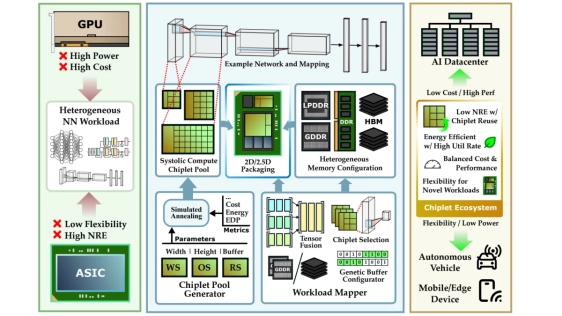Mozart: A Chiplet Ecosystem-Accelerator Codesign Framework for Composable Bespoke Application Specific Integrated Circuits
By Haoran Jin, Jirong Yang, Yunpeng Liu, Barry Lyu, Kangqi Zhang, Nathaniel Bleier
University of Michigan, USA

Abstract
 Modern AI acceleration faces a fundamental challenge: conventional assumptions about memory requirements, batching effectiveness, and latency-throughput tradeoffs are systemwide generalizations that ignore the heterogeneous computational patterns of individual neural network operators. However, going towards network-level customization and operator-level heterogeneity incur substantial Non-Recurring Engineering (NRE) costs. While chiplet-based approaches have been proposed to amortize NRE costs, reuse opportunities remain limited without carefully identifying which chiplets are truly necessary. This paper introduces Mozart, a chiplet ecosystem and accelerator codesign framework that systematically constructs low cost bespoke application-specific integrated circuits (BASICs). BASICs leverage operator-level disaggregation to explore chiplet and memory heterogeneity, tensor fusion, and tensor parallelism, with place-and-route validation ensuring physical implementability. The framework also enables constraint-aware system-level optimization across deployment contexts ranging from datacenter inference serving to edge computing in autonomous vehicles. The evaluation confirms that with just 8 strategically selected chiplets, Mozart-generated composite BASICs achieve 43.5%, 25.4%, 67.7%, and 78.8% reductions in energy, energy-cost product, energy-delay product (EDP), and energy-delay-cost product compared to traditional homogeneous accelerators. For datacenter LLM serving, Mozart achieves 15-19% energy reduction and 35-39% energy-cost improvement. In speculative decoding, Mozart delivers throughput improvements of 24.6-58.6% while reducing energy consumption by 38.6-45.6%. For autonomous vehicle perception, Mozart reduces energy-cost by 25.54% and energy by 10.53% under real-time constraints.
Modern AI acceleration faces a fundamental challenge: conventional assumptions about memory requirements, batching effectiveness, and latency-throughput tradeoffs are systemwide generalizations that ignore the heterogeneous computational patterns of individual neural network operators. However, going towards network-level customization and operator-level heterogeneity incur substantial Non-Recurring Engineering (NRE) costs. While chiplet-based approaches have been proposed to amortize NRE costs, reuse opportunities remain limited without carefully identifying which chiplets are truly necessary. This paper introduces Mozart, a chiplet ecosystem and accelerator codesign framework that systematically constructs low cost bespoke application-specific integrated circuits (BASICs). BASICs leverage operator-level disaggregation to explore chiplet and memory heterogeneity, tensor fusion, and tensor parallelism, with place-and-route validation ensuring physical implementability. The framework also enables constraint-aware system-level optimization across deployment contexts ranging from datacenter inference serving to edge computing in autonomous vehicles. The evaluation confirms that with just 8 strategically selected chiplets, Mozart-generated composite BASICs achieve 43.5%, 25.4%, 67.7%, and 78.8% reductions in energy, energy-cost product, energy-delay product (EDP), and energy-delay-cost product compared to traditional homogeneous accelerators. For datacenter LLM serving, Mozart achieves 15-19% energy reduction and 35-39% energy-cost improvement. In speculative decoding, Mozart delivers throughput improvements of 24.6-58.6% while reducing energy consumption by 38.6-45.6%. For autonomous vehicle perception, Mozart reduces energy-cost by 25.54% and energy by 10.53% under real-time constraints.
To read the full article, click here
Related Chiplet
- Interconnect Chiplet
- 12nm EURYTION RFK1 - UCIe SP based Ka-Ku Band Chiplet Transceiver
- Bridglets
- Automotive AI Accelerator
- Direct Chiplet Interface
Related Technical Papers
- ATSim: A Fast and Accurate Simulation Framework for 2.5D/3D Chiplet Thermal Design Optimization
- Automakers And Industry Need Specific, Extremely Robust, Heterogeneously Integrated Chiplet Solutions
- CHIPSIM: A Co-Simulation Framework for Deep Learning on Chiplet-Based Systems
- Universal Chiplet Interconnect Express: An Open Industry Standard for Memory and Storage Applications
Latest Technical Papers
- LaMoSys3.5D: Enabling 3.5D-IC-Based Large Language Model Inference Serving Systems via Hardware/Software Co-Design
- 3D-ICE 4.0: Accurate and efficient thermal modeling for 2.5D/3D heterogeneous chiplet systems
- Compass: Mapping Space Exploration for Multi-Chiplet Accelerators Targeting LLM Inference Serving Workloads
- Chiplet technology for large-scale trapped-ion quantum processors
- REX: A Remote Execution Model for Continuos Scalability in Multi-Chiplet-Module GPUs